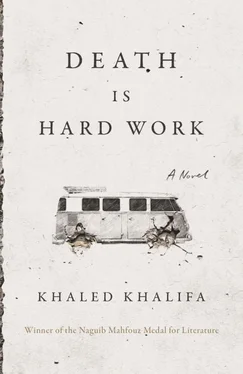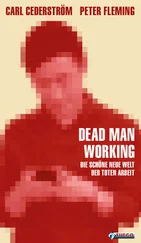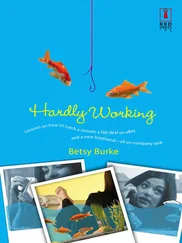But on the third day of his father’s treatment, Bolbol returned from work to find that the president’s portrait had been removed from its usual place on the wall. Abdel Latif gave him no opportunity to ask about it, and Bolbol didn’t dare object. He put the picture in his bedroom, but there it kept him up at night. This was odd; it was just a picture, after all, but spending night after night in the same room with it caused Bolbol’s worst and most terrifying preoccupations to resume. He covered up the portrait and propped it in a corner of the living room, behind the metal cupboard where he kept his plates. He didn’t dare to throw it out or tear it up; he would need it as long as he lived in this neighborhood. Between Bolbol’s unwillingness to challenge his father directly, and Abdel Latif’s studied avoidance of the topic, they both eventually forgot about it entirely.
Bolbol insisted on closing all the windows in the house for fear that the laughter of his father and the doctor would leak out and catch the attention of someone passing along the alley, who might then stick around to hear their conversations or the revolutionary songs they sang together between bouts of exchanging news from the battlefronts and commentary on political developments. The two of them were agreed that it was a revolution against the entire world, not just against the regime. Abdel Latif still loved big words, and he used plenty of them when describing the things that had happened during the brutal siege, when those who had remained behind had been forced to cook the leaves off the trees and to eat grass. They made bread from chaff, and shared what little they had left.
Their conversations about their inevitable victory conveyed nothing to Bolbol. His only thought was of his father’s illness—particularly, how he might rescue himself from the predicament it had caused. Bolbol offered to help his father bathe but was refused; Abdel Latif didn’t like seeing himself as a weak old man. Blood analyses showed that his illness was worsening and that hope of recovery was slight. Behind the siege lines, there had been whole months when he hadn’t taken his medicine, whole days together that he hadn’t eaten. He kept telling Bolbol about the siege, as if asking him not to forget, but Bolbol wanted very much to forget everything that had happened over the past four years. He felt like someone else—a stranger. His father deserved a true son of the revolution, someone brave like Dr. Nizar. The doctor wasn’t afraid of being associated with the revolution and had refused to flee the country even after he was arrested and tortured for three months. Bolbol couldn’t bear to hear him telling the details to Abdel Latif, who in turn regaled Nizar with tales of the torture undergone by the many other detainees he had known. These prisoners had returned hating the regime more than ever; when they spoke of what they’d endured, it was as though they were implying that revenge was the very least they could do in response. Bolbol’s father described in exhaustive terms how, in prison, many had transformed from peaceful revolutionaries to advocates of the utmost violence against the regime and its troops. He added, “Prison can kill you. The person who leaves is not necessarily you, even though they have your appearance.” Few retained their self-control and their reason; few remained loyal to their initial ideals. The terrible pressure of each successive story told in Bolbol’s house made him wish he were deaf—but he despised himself when he tried to avoid listening. It was only in the final weeks that he really began to worry that his father would die. The day they went to the hospital was the first time that Bolbol really thought about the chaos that could surround a body after death, given the state of things. It didn’t even occur to him that his father had been serious about that last wish he had repeatedly extracted Bolbol’s solemn promise to carry out.
Bolbol, Hussein, and Fatima successfully made it past the third checkpoint after the town of Deir Atiya, but the bleak road ahead didn’t exactly inspire them with confidence. Night was falling, and they had only gotten a quarter of the way: they were nowhere near Anabiya. The same mysterious number from which Bolbol had received his instructions as to where to collect his father on the outskirts of S had called his phone a number of times since that awful day—and now Bolbol was regretting that he’d never picked it up again. He was sure his father’s friends wouldn’t have let the ustadh be buried so far away from them. Perhaps they were even more resourceful than he’d ever guessed, these children of the revolution—they had managed to infiltrate everywhere, communicating by way of a system of secret codes. Maybe those men could have collected the body from anywhere at all and brought it anywhere with no problem. Maybe they should have been tasked with arranging the burial. Bolbol was suddenly confident that Abdel Latif’s friends could easily have spirited his father’s body away from the hospital and buried him in the new cemetery he had himself laid out during the siege in S. Then the dead man would have breathed freely, so to speak.
What did his father’s body mean? It was a harsh but justified question that night. All three of them were wondering it, but none had a clear answer. Silence had settled over the minibus. Hussein stayed silent to stifle his anger; Fatima was trying not to breathe, so they would forget she was there. The sounds of missiles and anti-tank bombs were getting closer; Hussein said dispassionately, “They’re bombing Homs,” before retreating back into his silence. They were all hoping for a miracle to come and save them from this desolation, the fear they couldn’t put into words, which burrowed into them all the same. These lulls offered a rare opportunity to talk but always came at inappropriate times, when no one was capable of speaking.
Fatima opened her window again. A cold breeze crept in. She suggested uncovering the body, but neither of her brothers replied, and she wasn’t about to reach out herself and draw back the blankets. Instead she tried to mop up some of the water streaming over the floor of the van from the melting ice blocks packed around the corpse. She was frightened, thinking about the terrifying smell oozing from the body’s pores, and her fingers were trembling by the time Hussein said they had no choice but to spend the night in the town of Z—but they didn’t know which side road to take, and the main highway between Homs and Aleppo had been closed for more than two years.
Hussein turned the minibus in what he thought was the right direction and sped on through the gloom. The road was full of holes, and Bolbol and Fatima held on grimly as the vehicle lurched and almost toppled over. Unable to hold on to anything, the body shuddered. Hussein’s rage was evident by now; he tried to call some friends to fix up a place to stay, raised his voice more than once, and eventually halted at the roadside, cursing the unreliable cell signal. Bolbol told him coolly not to worry about where they would stay; they would go to Lamia’s house. Fatima’s eyes glistened, and she looked at Bolbol sympathetically. Hussein said nothing, but a few minutes later he asked what sort of welcome they were likely to get from Lamia, in her husband’s house, after all these years. Bolbol was positive that it would work out, and in fact he only needed to tell Lamia in a steady voice that they would be in Z in a quarter of an hour, and that they needed her help, in order to be proved right. She was as kind and generous as ever, Bolbol thought as he hung up; she had begged them to be careful and promised to wait for them at the entrance to the town with her husband. The checkpoint there had a bad reputation as far as dealing with strangers; they had started filtering out and disappearing travelers who had been forced to pass through the town, or ransoming off the children from rich families.
Читать дальше












